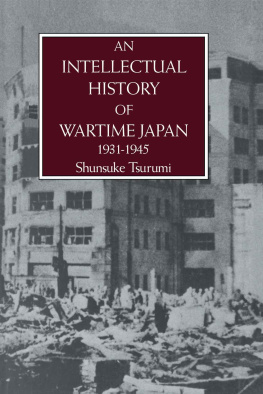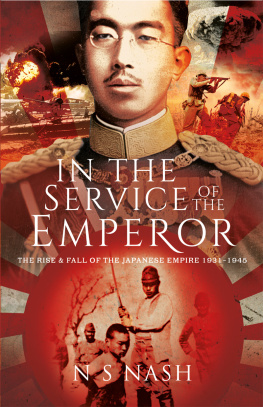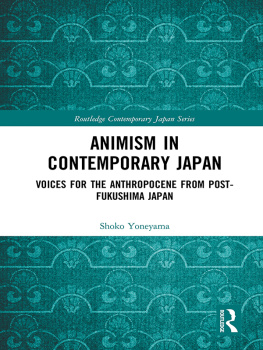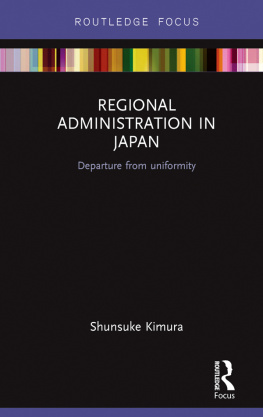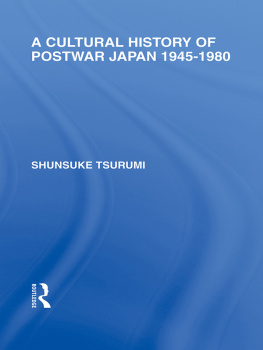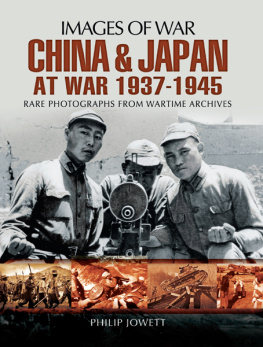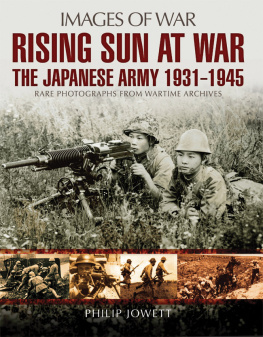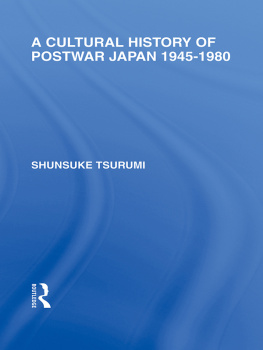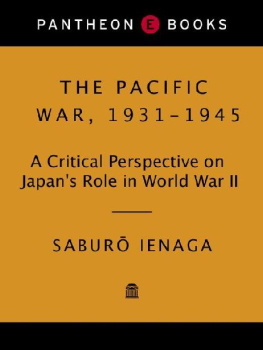Shunsuke Tsurumi [Tsurumi - An Intellectual History of Wartime Japan 1931-1945
Here you can read online Shunsuke Tsurumi [Tsurumi - An Intellectual History of Wartime Japan 1931-1945 full text of the book (entire story) in english for free. Download pdf and epub, get meaning, cover and reviews about this ebook. year: 1986, publisher: Taylor and Francis, genre: Politics. Description of the work, (preface) as well as reviews are available. Best literature library LitArk.com created for fans of good reading and offers a wide selection of genres:
Romance novel
Science fiction
Adventure
Detective
Science
History
Home and family
Prose
Art
Politics
Computer
Non-fiction
Religion
Business
Children
Humor
Choose a favorite category and find really read worthwhile books. Enjoy immersion in the world of imagination, feel the emotions of the characters or learn something new for yourself, make an fascinating discovery.
- Book:An Intellectual History of Wartime Japan 1931-1945
- Author:
- Publisher:Taylor and Francis
- Genre:
- Year:1986
- Rating:5 / 5
- Favourites:Add to favourites
- Your mark:
- 100
- 1
- 2
- 3
- 4
- 5
An Intellectual History of Wartime Japan 1931-1945: summary, description and annotation
We offer to read an annotation, description, summary or preface (depends on what the author of the book "An Intellectual History of Wartime Japan 1931-1945" wrote himself). If you haven't found the necessary information about the book — write in the comments, we will try to find it.
Shunsuke Tsurumi [Tsurumi: author's other books
Who wrote An Intellectual History of Wartime Japan 1931-1945? Find out the surname, the name of the author of the book and a list of all author's works by series.
An Intellectual History of Wartime Japan 1931-1945 — read online for free the complete book (whole text) full work
Below is the text of the book, divided by pages. System saving the place of the last page read, allows you to conveniently read the book "An Intellectual History of Wartime Japan 1931-1945" online for free, without having to search again every time where you left off. Put a bookmark, and you can go to the page where you finished reading at any time.
Font size:
Interval:
Bookmark:
INTELLECTUAL
HISTORY
OF
WARTIME JAPAN
1931-1945

Japanese Studies
General Editor: Yoshio Sugimoto
Images of Japanese Society Ross E. Mouer and Yoshio Sugimoto
An Intellectual History of Wartime Japan. Sbunsuke Tsurumi
INTELLECTUAL
HISTORY
OF
WARTIME JAPAN
1931-1945
Shunsuke Tsurumi

First published in 1986 by
Kegan Paul International
This edition first published in 2010 by
Routledge
2 Park Square, Milton Park, Abingdon, Oxon, OX14 4RN
Simultaneously published in the USA and Canada
by Routledge
270 Madison Avenue, New York, NY 10016
Routledge is an imprint of the Taylor & Francis Group, an informa business
This translation KPI Limited, 1986
Transferred to Digital Printing 2010
All rights reserved. No part of this book may be reprinted or reproduced or utilised in any form or by any electronic, mechanical, or other means, now known or hereafter invented, including photocopying and recording, or in any information storage or retrieval system, without permission in writing from the publishers.
British Library Cataloguing in Publication Data
A catalogue record for this book is available from the British Library
ISBN 10: 0-7103-0072-7 (hbk)
ISBN 13: 978-0-7103-0072-0 (hbk)
Publisher's Note
The publisher has gone to great lengths to ensure the quality of this reprint but points out that some imperfections in the original copies may be apparent. The publisher has made every effort to contact original copyright holders and would welcome correspondence from those they have been unable to trace.
To Mrs Mariane Young and the family
By the middle of the nineteenth century Japan had been a closed country for more than two hundred years. Then a period of constant communication between Japan and the outside world suddenly began.
The Fifteen Years War was in effect the intensification of relations between already warring nations. During the struggle of 1931 to 1945, Japan was engaged in incessant international activity. At the same time, these years were marked by intellectual isolation from the outside world. Just as much that is characteristic of Japanese culture developed in the earlier isolation, there were also significant developments in the later isolation. This period should not be ignored as a period of aberration from the main course of Japanese culture.
This book is based on lectures given at McGill University, Montreal, Canada, from 1979 to 1980. I wish to thank the East Asia Centre, McGill University, and the Japan Foundation for providing me with the opportunity of giving these lectures. I am also grateful to Professors Paul Lin, Sam Neumoff, Ward Geddes, and Yuzo Ohta.
The lectures were given in English and were later published in Japan in Japanese by Iwanami Shoten in 1982. I have avoided the use of Japanese words in preparing the English edition. The help of Dr Douglas Lummis of Tsuda College and Ms Tamara Lewit of the University of Melbourne has been invaluable. I am also grateful to Mesdames Bronwyn Bardsley, Jill Gooch, and Barbara Matthews of La Trobe University for typing several versions of the manuscript.
This book is dedicated to Mrs Mariane H. Young and her family, who gave me shelter from 1939 to 1941 while I was a student in Cambridge, Massachusetts, U.S.A.
S.T.
18 February 1984
Chronological Table
A.D. | 600-794 | Nara Period |
794-1392 | Heian Period and Kamakura Shogunate | |
1392-1615 | Muromachi and Azuchi-Monoyama Periods | |
1615-1868 | Edo Period | |
1868-1912 | Meiji Period | |
1912 | Taish and Shwa Periods |
(Source: Japan: the Official Guide, 1961)
I will begin with a few words on my subject matter, the intellectual history of Japan between 1931 and 1945.
Firstly, the problem of language: most of the events I shall discuss took place in Japan, and most of the thoughts I shall analyse first found expression in the Japanese language. Thus my use here of the English language creates a methodological difficulty. I have a hypothesis that in the majority of cases English-speaking Japanese are unreliable. This hypothesis tends to discredit whatever I might say in English about Japan. In the years since Japan's defeat in 1945, the English language has so infiltrated Japanese that words of English origin now flood everyday life, so that, for example, in a newspaper advertisement we might come across an expression like Chic na Dress no Fashion Show, which contains only two words - na and no - of Japanese origin. To quote another instance, an American scholar, who had studied the Japanese language for years, came to Japan and found in a scholarly journal a phrase which he could not decipher even with the help of a dictionary. He appealed to a Japanese colleague of the same discipline, sociology, and the phrase turned out to be hitto ando ran (hit and run). But it seems to me that my old hypothesis still preserves its validity, for the borrowing of European words does not necessarily mean the Europeanization of thought processes. By borrowing so many words in such a short time, the Japanese are in fact becoming incomprehensible even to themselves, because they have lost the means to grasp their own thought processes.
I shall begin with an account of what happened in Japan during the war years, and follow it by an attempt to understand what happened elsewhere and at other times.
Tenk In this fashion, the description of a particular event in Japan may, I hope, lead to a broader perspective upon the world.
One method of approach to cultural and intellectual history is to examine a deviation in order to reveal the essential characteristics of a national culture. What took place in Japan from 1931 to 1945 should not merely be dismissed as the product of a whim or thoughtlessness. With careful study, the period reveals much of both positive and negative value. What is true of a personal history is also true of a nation's history; we grow only by examining our errors, and this requires not only that we learn not to repeat them, but also that we grasp the element of truth and value contained in them.
We may date the beginning of World War II from the start of the Sino-Japanese War in 1931, the Fifteen Years War. When Japanese Army leaders began the fighting in Manchuria in 1931 and on this pretext established a puppet government in north-east China, they introduced to the world a new tactic, which was later to be used by Mussolini and Hitler. Thus, the Sino-Japanese War was the beginning of a new trend that influenced the whole world, and in this instance the local history of Japan had an unusual influence.
After the opening of Japan in the nineteenth century, a taste for things Japanese developed in the West. But among such noted commentators as Basil Hall Chamberlain, Lafcadio Hearn, and Bernard Leach, who were known primarily for their works about Japan, Leach - the potter - is the only one, to my knowledge, who did not later express disillusionment with his youthful affection for the country. When seen from the perspective of Korea, Japan reveals its horrible features. From the perspective of China, Japan reveals its shallowness. When a student from another land first studies Japan without either perspective, and then turns his eyes to Korea and China, he is bound to be disillusioned. Leach, however, from the first fostered an appreciation of Chinese and Korean culture along with that of Japan. He began with this perspective and therefore had no illusions to be destroyed. Of course, if one takes interest in Japan only as a form of exoticism, then one preserves the taste and viewpoint with which one was born and bred, unaltered by the contact with the exotic foreign culture. One's view of Japanese culture will remain static and will undergo no disillusionment or modification. Exoticism preserves one's distance from another culture, but genuine cultural contact is a process of weaving the other culture into the fabric of one's own. If one wishes to make this kind of acquaintance with Japan, it is important to place Japanese culture from the very first within the perspective of the cultures of other Asian countries, especially Korea and China. It is also important to see the Japan of today within the perspective of the Japan of the war years. It is these perspectives which I will attempt to provide.
Font size:
Interval:
Bookmark:
Similar books «An Intellectual History of Wartime Japan 1931-1945»
Look at similar books to An Intellectual History of Wartime Japan 1931-1945. We have selected literature similar in name and meaning in the hope of providing readers with more options to find new, interesting, not yet read works.
Discussion, reviews of the book An Intellectual History of Wartime Japan 1931-1945 and just readers' own opinions. Leave your comments, write what you think about the work, its meaning or the main characters. Specify what exactly you liked and what you didn't like, and why you think so.

